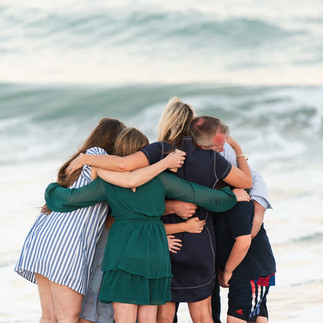The Sendoff
- Irreverenthealer

- Jan 31, 2023
- 6 min read

Last week we put my mom to rest, or rather out to sea. She has been sitting in my closet for a year. I had grown comfortably uncomfortable with her temporary resting place. Knowing she was nearby didn't make me feel closer to her, but it made me feel in control. Knowing where she was somehow made the loss of control that grief brings a little less unsettling.
My husband offered to get her for me when she first came home in a box, not an urn. I agreed, as I could not return to the room where I sat numb from grief and choice. Where a woman asked me if I wanted an urn, jewelry, or a plethora of commemorative keepsakes, I shook my head no. My mom wanted to be scattered in the ocean; we didn't need these containers. However, I paused at scatter tubes. Did we want tubes preloaded to scatter? I looked panicked at my husband and said, "yes, we need those." A quick amazon search later, my husband was telling the lovely saleswoman we did not need those, but I objected and said, "who would fill them?"
I vehemently muttered, "I could not do it." I shuttered at the thought.
I had done things I thought were unthinkable over the last month. I told my children their Sugar was dying, I told my brothers our momma was dying. I crushed medicine and fed it to my mother in a syringe each time, knowing she was one step closer to death. I held her hand and helped shepherd her to the other side, but I could not do this.
I could not handle my mother's ashes. I could not bear to see the arms that held me turned to ash, and I could not fathom seeing her reduced to rubble.
My husband quietly and kindly said, "I'll do it." I looked at him in disbelief. Still too numb to feel the gravity of the gift he offered, I nodded and wrote a check for my mother's remains.
Later on a walk with a friend, I recounted the story, and she immediately said, "oh honey, I'll scoop your mother's ashes." I laughed, and we continued walking.
But later, in that time of intense grief that followed my mom's passing, I remembered both of their words. I wept because life was so cruel and unfair, and I cried because, at the same time, it is so inexplicably beautiful. I wept because I had people in my life who would do the things I could not do.
How in a world so cruel does the universe create such incredible souls who will scoop your mother's ashes? Who will fly down and drink margaritas with you, hold your hand, send you notes, send you trees and flowers and tea? Who will scoop you up off the floor and prop you up because life is hard?
They are the lights in your life who hold you when the woman who always held you is gone.

I thought my mother's death would break me. In some ways, it did, but not in any of the ways I thought it would. I was not broken. I was broken open. I split in two. All the fear and burdens I had been carrying were no longer hidden; they were now in the light. The universe broke me open and poured light back into me through the love of humans willing to sit in my grief with me and prop me up on dark days.
All this to say, my mother's ashes have been with me for a while. My husband first put her in test tubes, and we carried her to the waters of the Caribbean to the banks of the Thames, to Portugal to Spain. Everywhere we go, we leave a bit of her behind.

Her memorial felt necessary but so final, and I was approaching it with equal parts dread and joy. When I feel unmoored, as I often have this year, I turn to books and podcasts and research pretty much anything that will give me a better understanding of how grief works.
The other day I listened to an interview with a funeral director/poet. I'll confess I had little interest in listening to this man. It seemed too weird even for me, but I turned it on in the name of research. And, yes, it was odd, but it was comforting. In a voice rich with a folksy, comforting twang, he described why we need funerals and memorials and how we behave around death. When asked why certain cultures spend days crafting intricate handmade coffins that no one will ever see after the deceased is laid to rest, he said we do these things in the name of love to get the dead to where they are going and the living to where they need to be.

And I was just bowled over by this. We grieve with our hands as well as our hearts. We bake, cook, build, sew, write, and craft as offerings to our beloveds. We plan funerals and memorials to honor our lost loves and allow them the freedom to move toward their eternal healing. As for those of us left behind who now no longer know how to be in this world without our loved ones, putting our loves to rest helps us settle into a new, utterly foreign space.
I recently attended the funeral of a friend who had lost her mom, and she asked that everyone wear bright colors because her mom would have loved that. The guest complied, and the pews were filled with brightly dressed mourners. She created a garden of grief as a tribute to her lost momma. It was beautiful, heartbreaking, and the send-off her mother needed to get her to where she needed to go. As we processed out of the funeral home to Wild Thing playing in the background, the room was filled with both laughter and tears.

Joy amidst heartbreak is the language of the grieving.
My poet/funeral home director guide also said he isn't keen on celebrations of life. Coincidentally it is a uniquely American phenomenon. In our fear of death, we have tried to whitewash, sanitize and clean up funerals. We try to make them happy affairs where we celebrate the departed's life. The only problem with this is you can only celebrate a life if you acknowledge that a life has been lost. We must grieve the loss to celebrate the love.
For my mom's memorial, I wanted to pay tribute to this great love we shared.

We made a weekend of it. My mom loved a good party when her family was close by. We ate at her favorite restaurants, played on the beach, told stories, and got tattoos in her honor. We had a party because it's what she wanted. She left very few instructions other than wanting all her kids and grandkids on her beach to scatter her ashes.

But then came the time to get her to where she was going. It was time to pay tribute to the great loss we all now shared.
I struggle to understand grief. I am intimately acquainted with it, yet, I find it impossible to define.
Grief seems to be where sorrow and joy intersect. It's the constant remembering of loss. It's the everyday mundane tasks of life now shrouded in sadness. It's a new world coated in bittersweet where often the bitter feels like it outweighs the sweet.
It's the going to text your mother about something inconsequential that only she would pretend to care about and realize you can't. It's going to send your daughter's first dance photo to her, catch your breath, and send it to a friend instead.
The void is the loss that we must pay homage to. I am convinced that great love begets great loss. The love and the loss are such a privilege. We must honor them both.
When we put my mother into the water, we sobbed and leaned into the void. We gave it its space, and it's due. The loss is too big. It must be recognized.
Then we danced, laughed through our tears, and felt the joy of celebrating a life well lived. We celebrated the great love of our mother under a brilliant pink sky.
We knew she got to where she was going. She was in the sea, the heavens, and our hearts.
As to getting us to where we need to be, it will take time. But remember, this earth is full of ash scoopers whose love will guide us toward the light, which is where we all are going.






























Comments